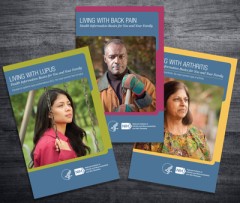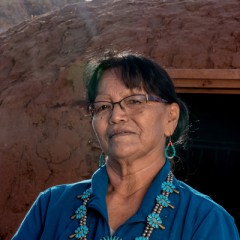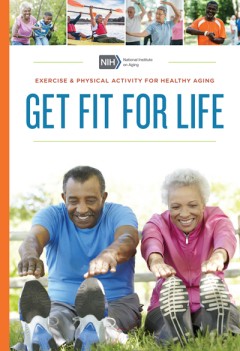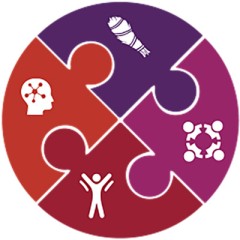November Is National Native American Heritage Month
During National Native American Heritage Month, we pay tribute to the rich ancestry and traditions of American Indians and Alaska Natives (AI/AN). We honor the health of Native people and strive to foster healthier AI/AN communities by advancing scientific research and distributing relevant health information.
In this special issue of Honoring Health, we share a sample of the health resources available from the National Institutes of Health (NIH).
Featured Health Information
NEW! Health Information Basics Series Now Includes Helpful Tools and Information About Back Pain

The NIAMS recently added a new title to its popular “Health Information Basics” series. The resource Living With Back Pain is now available. The NIAMS also recently updated two other resources in the series, Living With Arthritis and Living With Lupus. The free booklets, designed for patients and their families, present basic information about back pain, arthritis, and lupus in a simple, easy-to-read format and provide helpful tips on how to cope with these conditions. The booklets also include tools that you can tear out and use to record information to share with your doctor, including a symptom tracker, pain tracker, and medication tracker.
Order your copies today! You can also download and print full-color PDFs for each of the resources.
Our Work Can Affect Our Lungs: Help Promote Awareness About COPD

Chronic obstructive pulmonary disease (COPD) is a progressive lung disease that makes it difficult to breathe. Although it’s often thought to be a disease that affects people who smoke, it can also develop because of exposures to dusts and other lung irritants at work. Join the National Heart, Lung, and Blood Institute’s Learn More Breathe Better® program during National COPD Awareness Month this November and help raise awareness about COPD, its symptoms, and how it can be prevented. Visit nhlbi.nih.gov/COPDmonth to find a new Lung Health on the Job infographic; educational resources such as fact sheets, social media resources, videos, and teaching tools; and more.
Find Reliable Information on Alzheimer’s and Related Dementias
Alzheimers.gov, managed by the National Institute on Aging, has content on Alzheimer’s disease and related dementias from across the federal government. The website provides resources for people living with dementia and their family members, as well as health care providers and community and public health workers. It also includes information about participating in clinical research and how to find studies. Visit the website to learn more.
Get Fit for Life: Exercise and Physical Activity for Healthy Aging
Learn about the many types and benefits of exercise and physical activity with this interactive guide. Get Fit for Life can help you get started, reduce your health risks by exercising safely, and stay on track. It includes ideas for staying active, tracking tools and worksheets, and tips for staying motivated. Download, print, or order free copies today.
Native American Cancer Control Literature Database
The Native American Cancer Control Literature Database is a compilation of published scientific literature on cancer-related topics with Native American communities, including American Indian, Alaska Native, Native Hawaiian, and First Nations populations.
How Research Works: Understanding the Process of Science
This one-page guide, created by the NIH’s Science, Health, and Public Trust group, helps communicators put the process of science into perspective, which can help earn and build public trust in science. The COVID-19 pandemic has highlighted the crucial public health importance of explaining why science changes and why it’s important to expect that change.
Words Matter When Talking About Addiction
Simple changes in how we use language can reduce the stigma and negativity surrounding substance use disorders. “Words Matter” is a resource for understanding stigma, and how it prevents people with substance use disorders from seeking treatment. It also offers less stigmatizing words to use when talking about addiction. Health professionals can demonstrate leadership by changing their own language to destigmatize addiction.
News & Events
View Lecture on Connection Between Culture and Science
The NIH Tribal Health Research Office hosted a special National Native American Heritage Month event honoring and celebrating American Indian and Alaska Native ingenuity and culture. Dr. Donald Warne, who is the Director of the Indians Into Medicine and Public Health Programs and Associate Dean of Diversity, Equity, and Inclusion at the University of North Dakota, offered a virtual lecture about the interconnectedness of culture and science. Watch the lecture on the NIH Video Cast page and share it with your colleagues.
Image: Dr. Donald Warne (Oglala Lakota), Director, Indians Into Medicine
I Strengthen My Nation: AI/AN Youth Challenge Projects Final Submission Deadline Extended to December 10
Young people ages 14 to 25 years old who are concerned about substance misuse in their communities are encouraged to share their ideas for enhancing the resilience of Native communities and identifying solutions. The challenge from the National Institute on Drug Abuse, “I Strengthen My Nation,” will reward innovative ideas for community projects that support resilience against substance misuse. The final submission deadline for this challenge has been extended to December 10, 2021. Learn more and begin your submission today!
Image courtesy of We R Native.
Treating Opioid Use Disorder in Native Communities
Native communities face unique risk factors for opioid use disorder and have cultural strengths that can help people achieve recovery. This Research Spotlight explores a project that integrates medication-based treatment with healing traditions. Funded through the Helping to End Addiction Long-Term® Initiative, or NIH HEAL Initiative®, the researchers hope to begin testing the intervention, which incorporates spiritual and cultural elements in addition to physical and psychological considerations for treating opioid use disorder.
Strength-Focused Framework to Prevent AI/AN Youth Suicide
Researchers have developed a promising framework for suicide prevention in AI/AN communities. The research framework expands on conventional risk reduction strategies by placing Indigenous culture, knowledge, beliefs, and community collaboration at the center of the approach.
COVID-19 Updates
Get the latest public health information from the Centers for Disease Control and Prevention (CDC), and the latest research information from the NIH.
Additional resources include:
- 6 Questions (and Answers) About COVID-19 Variants, from the NIH Community Engagement Alliance
- COVID-19 Vaccines for Children and Teens, from the CDC
- Who Is Eligible for a COVID-19 Vaccine Booster Shot?, from the CDC
- Find a COVID-19 Vaccine Near You, from the CDC
Funding Opportunity
Intervention Research to Improve Native American Health (R01 Clinical Trial Optional)
The purpose of this Funding Opportunity Announcement is to support research on interventions to improve health in Native American populations. This includes (1) etiologic research, where there is a significant gap in knowledge, that will directly inform intervention development or adaptations, (2) research that develops, adapts, or tests the efficacy or effectiveness of health promotion and disease prevention interventions, (3) research that tests culturally informed treatment or recovery interventions, and (4) where a sufficient body of knowledge on intervention efficacy exists, research on dissemination and implementation that develops and tests strategies to overcome barriers to the adoption, integration, scale-up, and sustainability of effective interventions.
Applications are being accepted through May 17, 2023.






